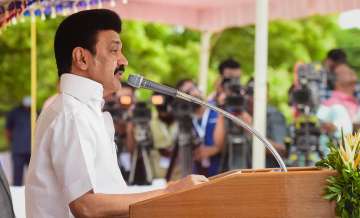DMK says socio-economic development initiatives cannot be termed 'freebies'
DMK's organising secretary R S Bharathi, who is the petitioner, said that the core of the Dravidian movement's ideology is socio-economic upliftment of the backward, most backward and all other oppressed sections of the society.

It is unacceptable to dub as 'freebies' initiatives aimed at socio-economic development of backward, most backward and all marginalised sections of the society, the DMK said on Sunday. Tamil Nadu's ruling party, which has knocked on the doors of the Supreme Court in the case against freebies, said the use of the word 'freebies' is wrong, inappropriate and unacceptable.
DMK's organising secretary R S Bharathi, who is the petitioner, said that the core of the Dravidian movement's ideology is socio-economic upliftment of the backward, most backward and all other oppressed sections of the society. Tracing the origin and rise of the Dravidian movement from the days of the Justice Party about a century ago, Bharathi told PTI that opening up access to education to the marginalised and backward people was the first step taken by the Justice Party (JP) stalwart Thiagarayar (1852-1925).
The JP leader made education, books and lunch available to school students free of cost. "This encouraged students to go to schools. How can you refer to such initiatives as a freebie? Such initiatives have evolved over time. The lunch scheme eventually blossomed into a nutritious meal programme. Now, our Chief Minister M K Stalin has launched the breakfast scheme for school students."
Only such schemes have broken social barriers and opened access to education to backward classes and others, which was once available only to a small section of people, he said.
Education was made available free of cost till the SSLC level during the times of former chief minister K Kamaraj. When DMK founder C N Annadurai assumed office, he ensured that it is open to students without cost till Pre-University level. "When Kalaignar (late chief minister M Karunanidhi) became Chief Minister this was extended further till the level of graduation. This ensured that students from backward classes and oppressed sections of society pursued education."
"Take the Rs 1,000 assistance scheme announced by our CM Stalin for girl students, this is women empowerment; this was the dream of social justice icon Periyar E V Ramasamy and forms the bedrock of Dravidian ideology," he said. Referring to socio-economic conditions and instances of women marrying at a young age by avoiding higher education, Bharathi said this assistance scheme would undoubtedly prompt families to send girls to college. Getting graduated would help girls to seek employment and be financially independent, he said.
The government had announced that all girl students who studied from classes 6 to 12 in state-run schools would be paid Rs 1,000 per month directly into their bank account till the uninterrupted completion of their undergraduate degree, diploma and ITI courses. The students would be eligible for this scheme in addition to other scholarships, the government had said. Through this programme, approximately 6 lakh girl students could potentially benefit each year. For this new scheme, Rs 698 crore was allotted in the state budget (2022-23).
Also Read | From 'loan waivers' to 'direct transfers', KNOW how Election Commission of India defines 'freebies'
This year, the Moovalur Ramamirtham Ammaiyar Memorial Marriage Assistance Scheme was transformed as Moovalur Ramamirtham Ammaiyar Higher Education Assurance Scheme. Bharathi gave another example of providing colour televisions to beneficiaries during the previous DMK regime (2006-11) helmed by Karunanidhi. "With the implementation of this scheme, one could find televisions in huts. Once, they used to stand in front of houses that had television to watch some of their favourite shows. He (the beneficiary) cannot afford to buy a TV. Hence, it was given free of cost to him. It was absolutely not a freebie."
The DMK's organising secretary said that his party is fully committed to social equality. However, those betting on 'Manu Dharma' that divides people into four classes cannot understand equality, he said. Hence dubbing initiatives aimed at socio-economic development of backward classes, most backward, the scheduled castes and tribes as 'freebies' went against the lofty principles of social justice, he said.
Also Read | Supreme Court adjourns hearing on 'freebies' promise by political parties during polls for August 22